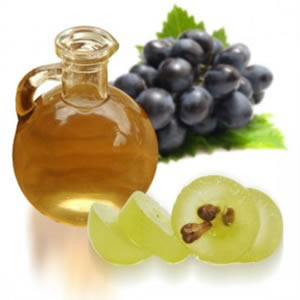Difference between Safflower and Grape Seed Oil
Key difference: Primarily, safflower and grape seed oil differ in their origins along with their fat compositions. Safflower oil obtained from safflower seeds is full of monounsaturated fats. While, Grape Seed oil obtained from grape seeds, the by-products of winemaking are composed of polyunsaturated fats. Both oil’s fat compositions are known to maintain the cholesterol levels.
All oils plays vital role in health aspects, as the fat concentration greatly affects an individual’s daily diet and food –routine. A fit and fine body is a sign of good oil and fat consumption.
Safflower and Grape seed oils are known as the health nourishing oils. Both, oils are made by pressing or steaming their respective seeds in order to separate the oil part. These oils are great sources of unsaturated fats; which help to enhance the healthful cholesterol levels in the bloodstreams. Both, oils are beneficial for maintaining the weight, hence are generally preferred and suggested for the health conscious ones. Also, both oils are efficient cooking oils; but the grape seed oil's high omega-6 content makes it slightly more healthful than safflower oil, which is generally used for high-temperature cooking.
.jpg) Safflower oil is extracted from safflower seeds. The safflower plant is herbaceous thistle flower of sunflower family. Safflower oils exist in two different types: one, high in monounsaturated fatty acid (oleic acid) and other high in polyunsaturated fatty acid (linoleic acid). Industrially, these oils are used in paints, particularly in white paints. While, high linoleic safflower oil proves beneficial for dietary purposes; as it helps to regulate the blood glucose levels and fatty-acid breakdown process. A protein named, adiponectin is found in the oil, which reduces the issues related to menopause in women; hence this oil is beneficial for them. Also, the oil has the ability to prevent the heart related issues, such as the hardening of the arteries in atherosclerosis and stroke; hence the oil would be a best choice for the heart patients.
Safflower oil is extracted from safflower seeds. The safflower plant is herbaceous thistle flower of sunflower family. Safflower oils exist in two different types: one, high in monounsaturated fatty acid (oleic acid) and other high in polyunsaturated fatty acid (linoleic acid). Industrially, these oils are used in paints, particularly in white paints. While, high linoleic safflower oil proves beneficial for dietary purposes; as it helps to regulate the blood glucose levels and fatty-acid breakdown process. A protein named, adiponectin is found in the oil, which reduces the issues related to menopause in women; hence this oil is beneficial for them. Also, the oil has the ability to prevent the heart related issues, such as the hardening of the arteries in atherosclerosis and stroke; hence the oil would be a best choice for the heart patients.
 Grape seed oil is extracted from the grape seeds, which are the grape fruit by-products obtained after wine making. The oil is clean and light in taste with high concentration of polyunsaturated fat contents. Industrially, this oil is used in cosmetics products, as it can control the moisture content of skin. It is also used as a lubricant for shaving. Grape seed oil is one among the essential oils which are applicable in aromatherapy. Along with these, the oil is heavily used in bakery products, it is spread on raisins to retain their flavor, also is one of the known ingredients in salad dressings and mayonnaise preparation. Grape seed oil act as a base in infusions of garlic, rosemary, or other herbs or spices.
Grape seed oil is extracted from the grape seeds, which are the grape fruit by-products obtained after wine making. The oil is clean and light in taste with high concentration of polyunsaturated fat contents. Industrially, this oil is used in cosmetics products, as it can control the moisture content of skin. It is also used as a lubricant for shaving. Grape seed oil is one among the essential oils which are applicable in aromatherapy. Along with these, the oil is heavily used in bakery products, it is spread on raisins to retain their flavor, also is one of the known ingredients in salad dressings and mayonnaise preparation. Grape seed oil act as a base in infusions of garlic, rosemary, or other herbs or spices.
All vegetable oils are generally cooking oils which break down at a certain temperature and emit smoke, and then the oils produce the cancer-free radicals which make them unsuitable for consumption. So, in case of the above mentioned oils, grape seed oil has a high smoke point and it breaks down only after it reaches 420 degrees Fahrenheit. However, the refined safflower oil's smoke point is 450 to 510 degrees Fahrenheit, and which is much higher as compared to that of safflower oil. Generally, the grape seed oil is used for high-temperature cooking. Safflower and grape seed oil are rich in monounsaturated and polyunsaturated fats, and hence they help to reduce LDL, or "bad," cholesterol levels, and increase the HDL, or "good," cholesterol level.
Hence, these oils can be regarded as one among the health friendly oils in the market. While, food is the only source for essential fatty acids, which are known to promote the healthy brain functioning, growth and development; the grape seed oil proves more beneficial and provides a good potential than safflower oil.
Comparison between Safflower and Grape Seed Oil:
|
|
Safflower Oil |
Grape Seed Oil |
|
Obtained from |
safflower seeds |
grape seeds, which are by-products obtained from winemaking |
|
Composed of |
monounsaturated fats |
polyunsaturated fats |
|
Smoke Point |
refined safflower oil's smoke point is 450 to 510 degrees Fahrenheit, and which is much higher than compared to grape seed oil |
has a high smoke point and begins to break down only after it reaches 420 degrees Fahrenheit |
|
In cooking, can be used for |
searing, browning and deep-frying, higher-heat baking, stir-frying and oven cooking |
higher-heat baking, stir-frying and oven cooking, salad dressings and mayonnaise and as a base for oil infusions of garlic, rosemary, or other herbs or spices |
|
High Temperature Cooking |
Yes, suitable |
No, not suitable |
|
Fat Compositions |
|
|
|
Are they beneficial for weight control? |
Yes |
Yes |
|
Health Benefits |
Reduces Issues like:
|
|
Image Courtesy: worldhealth.net, simplyorganico.com









Comments
It was very informative article......i like it.....
Neeta
Wed, 04/23/2014 - 12:05
Add new comment